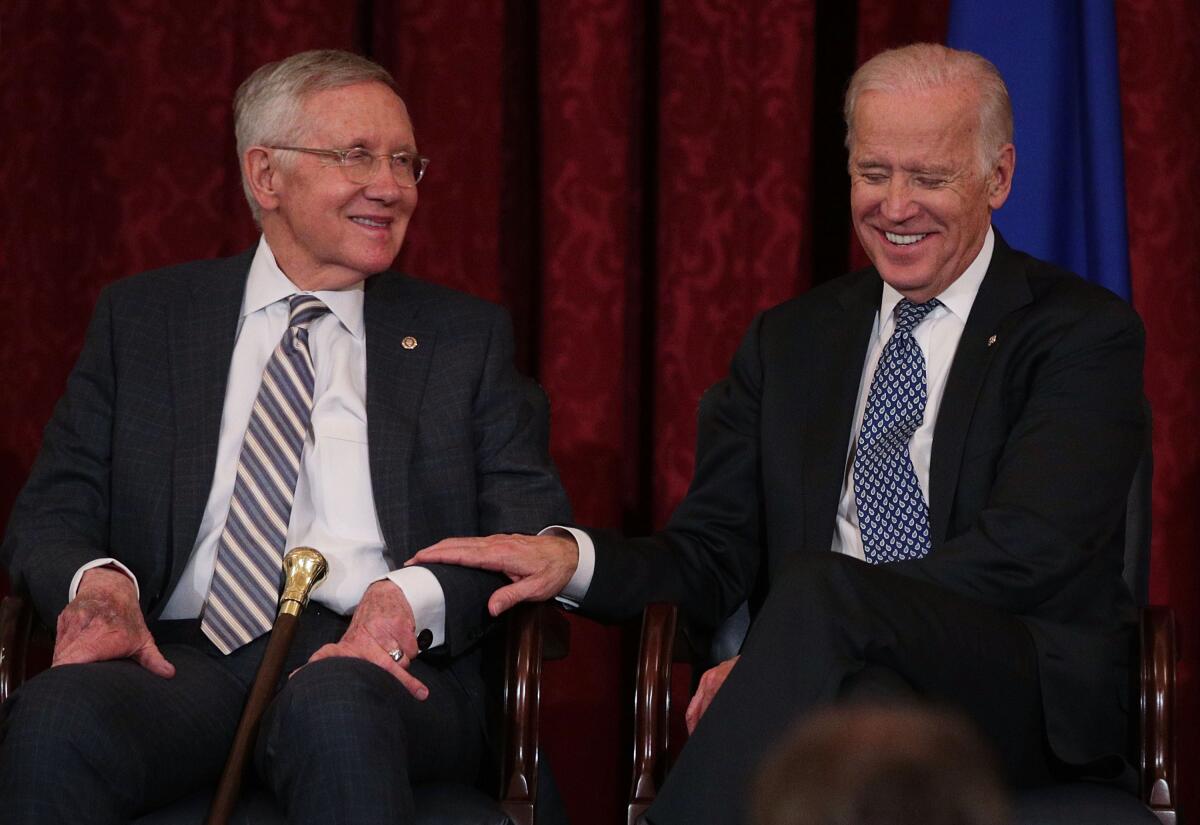A Word, Please: Oxford comma enthusiasts are mistaken about the superiority of their preference

- Share via
There’s a growing fanaticism in this country — a belief system so extreme its followers are impervious to all logic and facts. If you don’t agree with them, you’re beneath contempt. If you try to reason with them, your words fall on deaf ears, or worse, you’re accused of complicity in any number of blood-curdling atrocities. And though this dangerous extremism has been simmering for decades, the advent of social media has hastened radicalization, posing a threat to reasonable people everywhere.
I’m talking, of course, about the Cult of the Oxford Comma, which reared its ugly head recently on Twitter when an obscure California attorney tweeted an example of the Oxford comma’s supposed superiority.
The tweet was an image of a Politico headline: “How Harry Reid, a Terrorist Interrogator and the Singer From Blink-182 Took UFOs Mainstream.” Above the image was the lawyer’s commentary: “And always remember to use the Oxford comma, kids.”
The dog whistle was heard far and wide. About 8,000 Oxford comma fanatics retweeted it and 80,000 liked it. They agreed that, without an Oxford comma after “interrogator,” the headline suggested that Harry Reid was not just a former United States Senator but also a terrorist interrogator and the front man for a rock band.
In the replies, hundreds of cultists took shots at the headline writer.
“I didn’t know Blink’s singer was named Harry Reid,” one replied.
“People who do not use the Oxford comma deserve a hefty fine, a 90 day jail sentence, and a day and night listening to lectures by Alan Greenspan,” another insisted.
Grammar rules are based on common usage — the way people speak naturally. So it’s a paradox of language that the more you overthink your grammar and word choices, the more likely you are to goof up.
Strong words from true believers. There’s just one problem. They’re wrong. An Oxford comma would not improve the Politico headline. Instead, it would make it ambiguous.
The Oxford comma, also called a serial comma or series comma, is the one before “and” in a list of three or more items. So it’s the second comma in “The flag is red, white, and blue.”
The Oxford comma is optional. The Chicago Manual of Style, followed by many book and magazine publishers, says to use it. But Associated Press style, followed by most news media, says to skip it: “The flag is red, white and blue.”
Both methods are correct. But don’t tell that to Oxford comma cultists like the judge who, in his zeal to promote his comma cause, screwed up a 2017 court ruling. And don’t tell it to the countless thousands of internet denizens who supply “proof” of the Oxford comma’s superiority in the form of a cartoon about JFK, Stalin and strippers.
Their devotion blinds them to the fact that, while an Oxford comma can sometimes remove ambiguity, other times it creates ambiguity.
To see why, it helps to understand appositives. An appositive is a noun that amounts to a repeated reference to another noun: “Your father, a true gentleman, is loved by many.” Commas set off appositives, which is how we know “a true gentleman” is appositive to your father. Your dad and the gentleman are one and the same, and the commas tell us so.
In the Politico headline, inserting an Oxford comma would suggest “a terrorist interrogator” might be appositive to Harry Reid — he may be the interrogator: Harry Reid, a terrorist interrogator, strikes fear in the hearts of Al-Qaeda members.
But wait, cultists say. Without an Oxford comma, the headline means Harry Reid is both a terrorist interrogator and a singer.
Wrong.
True, an appositive can have two nouns: Your father, an officer and a gentleman, is loved by many. But you need the comma after “gentleman” to make it appositive. Otherwise, you’re talking about three people: Your father, an officer and a gentleman walk into a bar.
The same is true for our Politico headline. If you were to put a comma after “the singer from Blink-182,” you would be creating a two-noun appositive to Harry Reid. “How Harry Reid, a Terrorist Interrogator and the Singer from Blink-182, took UFOs Mainstream. But without a comma after Blink-182, there’s zero ambiguity. The original headline can only mean these are three different people. So an Oxford comma would make this headline worse, not better.
June Casagrande is the author of “The Joy of Syntax: A Simple Guide to All the Grammar You Know You Should Know.” She can be reached at JuneTCN@aol.com.
All the latest on Orange County from Orange County.
Get our free TimesOC newsletter.
You may occasionally receive promotional content from the Daily Pilot.




